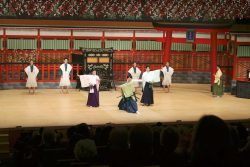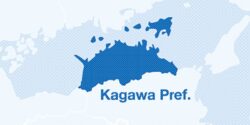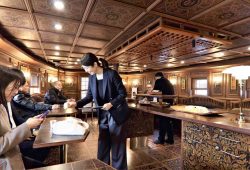Local Bodies, NPOs Help Bridge Disparities in Children’s’ Opportunities to Be Exposed to Art, Cultural Activities

A ticket for a musical that was kept by a child who watched and enjoyed the show, is seen in Toyonaka, Osaka Prefecture, in January.
6:00 JST, May 10, 2024
Concerns over some children’s inability to participate in cultural and other activities have spurred efforts in both the public and private sectors to remedy this “experience gap.”
A variety of factors can prevent children from engaging in such things as outdoor events, cultural arts and sports, including poverty, nonattendance at school and parents’ busy schedules. To overcome this problem — which often goes unrecognized — companies, local governments, NPOs and other organizations are working together to provide detailed support.
One such effort is the “Kokoro ha” project, which invites children up through high school age and their families to such performances as puppet shows and concerts in various locations. The program is run by JTB Communication Design, Inc., a Tokyo-based company that manages and operates about 60 cultural and other facilities.
In January of this year, 47 children were invited to watch “John Manjiro’s Dream,” a musical by the Shiki Theatre Company performed in Toyonaka, Osaka Prefecture, through the city’s social welfare council.
After seeing the play, the children commented on how powerful it was and how much they were moved. A female student who had been truant from school said with a smile, “The wonderful songs drew me in.”
A single mother who attended the performance with her daughter, then a second-grade student in elementary school, said, “I’ve been up to my eyes with work every day and couldn’t afford to experience art as a family, so [the performance] cheered me up.”
JTB Communication Design plans to invite children to 15 facilities this fiscal year. However, “just putting out a call doesn’t get the information to the target households,” a person involved with the project said. “We are promoting the program in cooperation with local social welfare councils that provide daily life counseling and support, as well as organizations that operate kodomo shokudo [cafeterias that offer free or low-priced meals to children].”
The Education, Culture, Sports, Science and Technology Ministry analyzed data from a national survey that followed more than 20,000 children until the age of 18. It found that children who had more experiences during elementary school — such as playing in rivers, visiting museums, watching sports, reading books and helping around the house — tended to have higher self-esteem and were more proactive when they were in high school.
However, opportunities for such experiences may be influenced by a family’s economic situation.
Chance for Children, a Tokyo-based public interest incorporated association, surveyed approximately 2,100 parents of elementary school children in October 2022. According to that poll, 29.9% of children in households with annual incomes of less than ¥3 million had had no out-of-school experiences in the past year. This was 2.6 times the rate of those in households with incomes of ¥6 million or more (11.3%).
In response, the association started the “Halocal” project to deliver digital coupons worth up to ¥100,000 to elementary school students from low-income households as “scholarships” that can be used for lessons and other activities.
The program is funded by donations and is operated in association with organizations and individuals in various regions. Approximately 140 students in Tokyo and the prefectures of Miyagi, Okayama and Okinawa received the coupons in fiscal 2023.
One of the participating organizations, the Tokyo-based NPO Charity Santa, introduced coupons for community center classes such as taiko drumming in an email newsletter for low-income households. The newsletter is distributed in cooperation with Okayama City and the city’s social welfare councils.
“We encourage children who may be reluctant to ask their parents to attend activities, as well as parents who are concerned about participating due to financial difficulties, to feel at ease,” said Izumi Kawazu, a member of Charity Santa’s board of directors.
According to Makiko Nakamuro, a professor of educational economics at Keio University: “The number of local children’s associations and youth education facilities is decreasing due to the declining birth rate, and school events have also shrunk due to the COVID-19 pandemic.
“We can cooperate with support groups, through activities such as cooking with people or accompanying them to art events. We hope that many adults in the community will take an interest.”
Top Articles in Society
-

Producer Behind Pop Group XG Arrested for Cocaine Possession
-

Man Infected with Measles Reportedly Dined at Restaurant in Tokyo Station
-

Man Infected with Measles May Have Come in Contact with Many People in Tokyo, Went to Store, Restaurant Around When Symptoms Emerged
-

Woman with Measles Visited Hospital in Tokyo Multiple Times Before Being Diagnosed with Disease
-

Australian Woman Dies After Mishap on Ski Lift in Nagano Prefecture
JN ACCESS RANKING
-

Producer Behind Pop Group XG Arrested for Cocaine Possession
-

Japan PM Takaichi’s Cabinet Resigns en Masse
-

Man Infected with Measles Reportedly Dined at Restaurant in Tokyo Station
-

Israeli Ambassador to Japan Speaks about Japan’s Role in the Reconstruction of Gaza
-

Videos Plagiarized, Reposted with False Subtitles Claiming ‘Ryukyu Belongs to China’; Anti-China False Information Also Posted in Japan






















